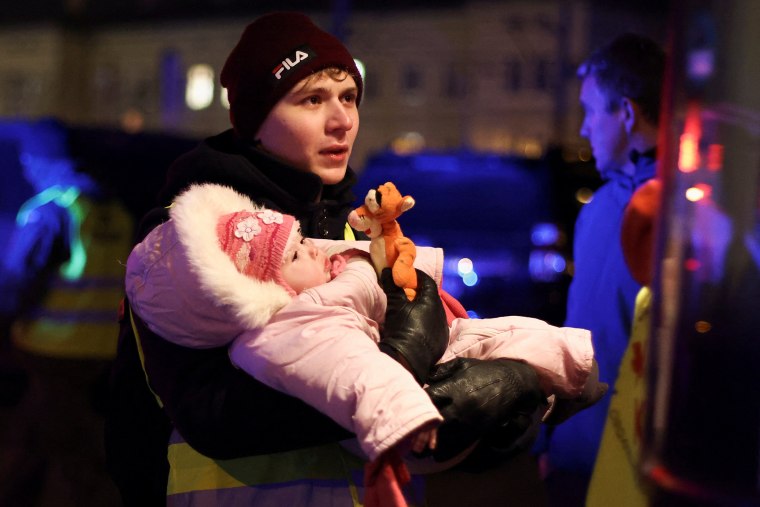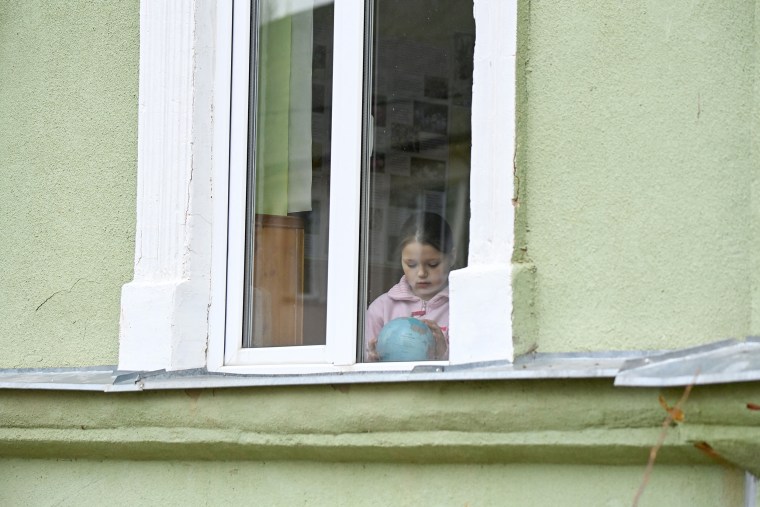Wendy and Leo Van Asten of Fitchburg, Wisconsin, haven't been sleeping or eating much since Russia invaded Ukraine. They fear the Ukrainian orphans they are in the process of adopting — a 14-year-old girl and her 15-year-old brother — could end up in harm's way, so they're panicked and desperate to get them out of the country. The U.S. government should step in urgently to help them — along with the other American families who are in the process of adopting children from Ukraine.
The laws make it difficult to help keep these children safe during a crisis.
The Van Astens have been hosting the siblings they plan to adopt for holidays and summers in their home in the U.S. since 2018. The teenagers refer to them as their mom and dad. They say I love you. They keep in touch via phones the Van Astens purchased for them. Recently, their prospective son used that phone to text them that he feared being killed in the war.
"I already consider myself a mother to these children even though the legal paperwork doesn't say it," Wendy Van Asten told me. "I can't imagine the loss of a child. Every day I think, 'I don't know if I'll ever see them again.'"
Like anyone would do in this kind of situation, the couple has been reaching out to anyone who might be able to help. After I learned of their story from a colleague who adopted a child from the same Ukrainian orphanage, I reached out to a couple of my contacts at the State Department to ask for guidance.

The Ukrainian government has approved the Van Astens to adopt from the country. They are now up to where they need to take three trips to Ukraine as part of the formal adoption process, including a court hearing and medical and visa appointments. But now, with the country under attack and given the highest warning level for travel, the couple wants to get the children out of the country temporarily to keep them safe.
When the fighting broke out, the children were evacuated from their orphanage outside Sloviansk to another facility in Lviv.
"The orphanage says Lviv is safe for now, but… we are on pins and needles," Wendy Van Asten said.
The thought of Russia winning the war is also harrowing because Russian President Vladimir Putin banned Americans from adopting from his country starting in 2013. So the Van Astens and the other American families who are in the process of adopting Ukrainian children need help immediately. In 2020, according to the State Department, Americans adopted 211 children from the country.
The Van Astens would like to temporarily host the children they are working to adopt on B-2 visas — which they've received to enable them to make their past trips to the U.S. — but they need permission from both Ukraine and the U.S. to do so. They've been frantically writing to President Joe Biden and members of Congress to beg for help and asking their friends and family to write to their legislators, too. But they shouldn't have to mount this kind of campaign.
The thought of Russia winning the war is also harrowing because Russian President Vladimir Putin banned Americans from adopting from his country starting in 2013.
The laws make it difficult to help keep these children safe during a crisis. As a State Department spokesperson told me in an email, it's difficult for foreigners to obtain B-2 visas because under the law applicants are presumed to be trying to immigrate permanently to the country, and the burden is on them to prove otherwise to consular officers. Additionally, the U.S. doesn't have an "emergency" visa category. The spokesperson also said prospective adoptive parents should be in touch with the groups known as accredited adoption service providers who facilitate adoptions from Ukraine and that the department is actively working with these groups "to provide guidance and answer questions during this critical time."
But the State Department should assign foreign service officers to be in direct communication with every family that is in the process of adopting a child from Ukraine and do everything it can to assist them. This includes helping them get permission for these children to leave Ukraine and temporarily stay with American families like the Van Astens who have already been approved to host them. Then the U.S. government should work with Ukraine to see how it might be possible for families who have already been approved to adopt to move forward on the final bureaucratic steps to legally finalize their adoptions while these kids are safe in the U.S.
Of course, if the fighting ends and Ukraine wins the war, the children can return to Ukraine to complete the process. But for now, they shouldn't be kept in a country under siege while they have loving prospective parents who desperately want to provide them with safe homes.
"We're begging and pleading the people who have the power to save lives to take the next step," Leo Van Asten told me.
It's unconscionable that Americans who are trying to complete their families and get children out of a war zone should have to beg their government for help at all.
Related:


